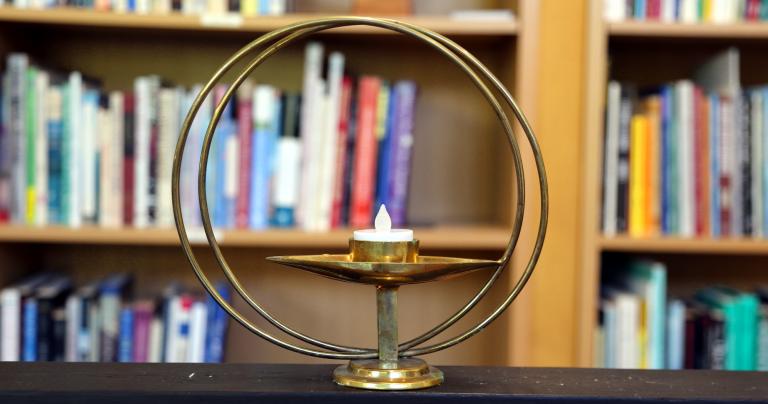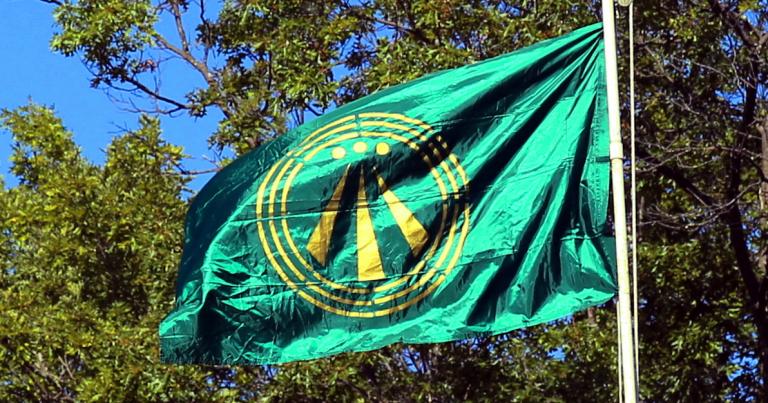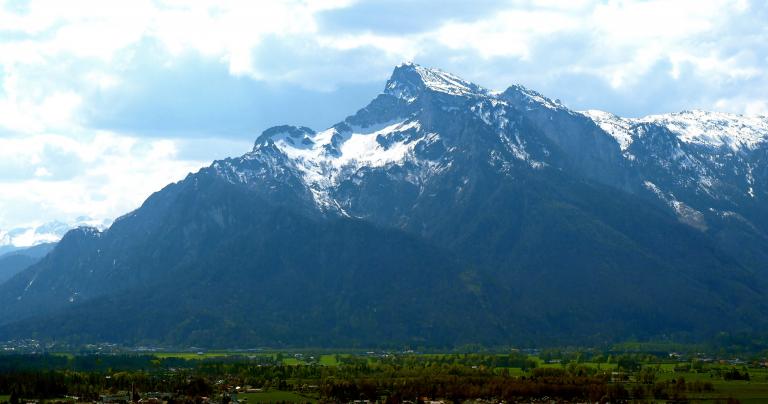I haven’t done a Conversations Under the Oaks Q&A in quite some time, so I got a lot of good questions when I asked for them earlier this week. It will take multiple blog posts to answer them all.
Today’s questions have a common theme: religious institutions and identities.
How do you reconcile hard polytheism with Unitarianism? I’m having some theological stumblings right now with the “Spirit of Life” / monotheistic / Unitarian concept.
This is a good question, not just for someone who wants to practice Paganism or polytheism in a Unitarian Universalist context, but also for our diverse mainstream society. How can we come together when our beliefs are so different?
The first thing to understand is that contemporary Unitarian Universalism is not the Unitarian Christianity of Channing, the Universalism of Murray and Ballou, or the Transcendentalism of Emerson. Nor for that matter is it the Humanism of the mid-20th century. It is the direct descendant of all those traditions and it contains elements of them, but it has evolved into something quite different.
Contemporary Unitarian Universalism is based not on common creeds or theologies, but rather on shared values, beginning with “the inherent worth and dignity of every person.” Those shared values are why monotheists, polytheists, and non-theists can gather together on Sunday mornings (and at other times during the week – good religion isn’t something you only do on special days) and worship together. UU worship does not affirm the primacy of any deities or beliefs about deities. Rather, it affirms the primacy of living together in a way that is respectful, sustainable, and mutually supportive.
“Spirit of Life” is a beautiful song – that’s why so many UUs love it. But compare it to a Christian hymn like “A Mighty Fortress Is Our God” or one of the better Pagan anthems like Damh the Bard’s “Land, Sky and Sea.” Those songs make you feel good too, but they also make a specific theological statement. “Spirit of Life” can mean whatever you want it to mean, within the general framework of UU values. That is both the strength and the shortcoming of Unitarian Universalism.
I could never be only a UU. It’s not that the remnants of congregationalist Christianity and of atheistic Humanism bother me. They’re meaningful to many UUs, and so I accept them in the same spirit that I expect others to accept the elements of Paganism and polytheism I work into the Sunday services I lead – an expectation that is usually met (though not always).
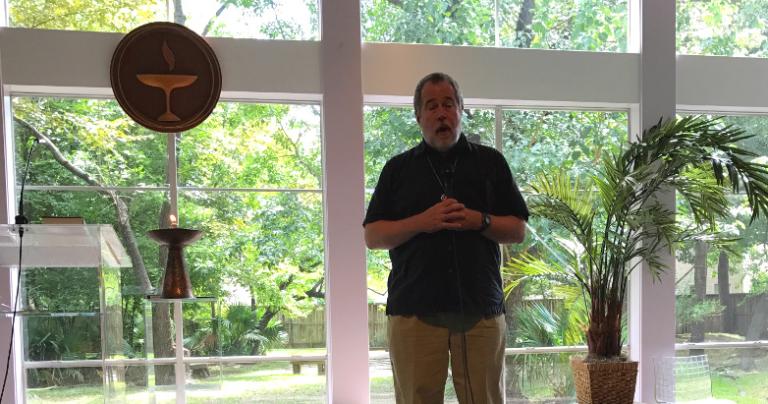
But I need a religion that doesn’t just accept my belief in Gods, spirits, and magic – I need a religion that actively affirms it. Even CUUPS, even Denton CUUPS with its excellent spiritual depth, can’t do that. I need to practice in a group where common beliefs promote spiritual intimacy and support ecstatic vulnerability.
The polytheist traditions of which I’m a part provide that affirmation. But they’re more like networks than institutions, and they’re small – they don’t have the resources to support the kind of community presence and outreach that UU churches and the UUA do. That presence and outreach is necessary to promote my values in a world that is often opposed to them. So I happily join with people of many beliefs and of no beliefs to support those values through Unitarian Universalism.
It’s important to remember that from a definitional standpoint, polytheism is not a religion. It’s a religious perspective. According to the Anomalous Thracian, it’s a religious orientation. There are many polytheist religions. Kemeticism, Hellenism, and Heathenry are not “denominations” of polytheism – they’re separate religions that are polytheist in nature.
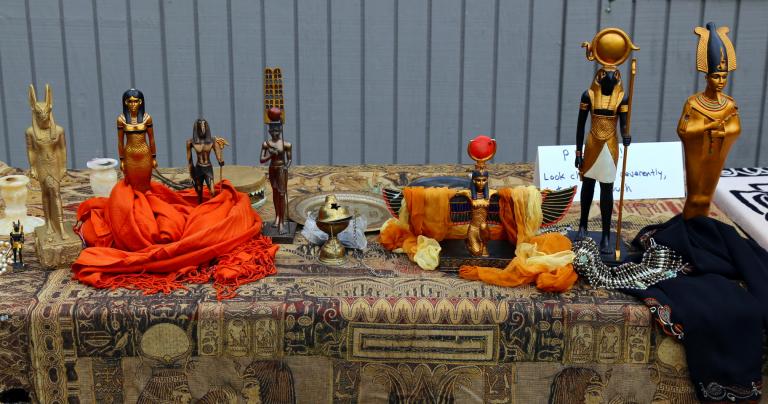
In contrast, Unitarian Universalism is a religion. Our word “religion” comes from the Latin religio (meaning “obligation, bond, reverence”) and the Latin religare (meaning “to bind together”). UUs aren’t bound together by common beliefs, but by shared values and by a commitment to putting those values into practice here and now. And since Unitarian Universalism makes no theological demands of its members, it is perfectly possible to be a good UU and also a good Kemetic or Hellenist or Heathen. Or a polytheist Druid.
So, how do I reconcile polytheism with Unitarianism? I don’t, because I don’t have to. But that doesn’t keep me from being both a polytheist and a Unitarian Universalist.
Why do you think most self-identified Pagans have issues with institutionalized religion? Would you say that any of the modern Pagan religions have the potential to grow like churches and/or synagogues?
Most Pagans grew up in other religions and many of us were injured in them. More often than not, the religious institutions focused on protecting themselves and not on caring for those who were hurt. Our own Pagan institutions – such as they are – have generally been no better. This is because this isn’t an religion problem, it’s a human problem.
All human institutions are flawed. Even the most basic and most sacred institution – the family – is flawed. The few of us who haven’t experienced it first-hand know plenty of abusive parents, manipulative patriarchs and matriarchs, and the ever-present compulsion to conform.
Plus let’s be honest – a lot of Pagans just want to do their own thing. Not only do they not want to be “told what to do,” they don’t even want anyone suggesting that there might be a better way than what they’re already doing.
At the same time, humans are social animals, and we can accomplish far more together than separately. Creating and participating in institutions is a bargain. We give up a bit of autonomy in order to get the benefits of community. Now, that’s no excuse to overlook abusive behavior. All institutions need policies and processes to discourage improper conduct and to promptly deal with it when it does occur – because it will.
We’re hampered by our short-sightedness. We look at Christian churches – because that’s mainly what we see in this society – and we assume that’s what any religious institution should look like. I don’t think we’ll ever see a Pagan version of the Roman Catholic Church, or even the Southern Baptist Convention. We would be better off looking at the organizational structures in Judaism, Buddhism, and Islam. All of those are far more decentralized than Christianity.
As for current Pagan institutions, ADF was founded to be a Pagan church. It’s still relatively small (under a thousand members) and while it’s survived the death of its founder, it has yet to have an Archdruid from the “next generation.” I’m a member of ADF and I’m friends with many ADF leaders – I’m not an objective observer. I still have high hopes that it will become a nationwide if not worldwide institution, but that remains to be seen. Numerous other organizations fall into this category.
As far as I know, the largest Pagan organizations are Covenant of the Goddess (CoG) and the Order of Bards, Ovates and Druids (OBOD). Neither of them resemble a church and both are highly decentralized. I’m a member of OBOD – the vast majority of its members are solitaries. Is there enough common practice in OBOD for it to be considered a religion? I think most OBOD members would say no.
To use a biological metaphor, Paganism is currently in a “speciation” phase. We’re developing lots of little groups and traditions. Most of them will go extinct in a few years, and most of those that don’t won’t survive the death of their founders. But the few that are especially well adapted to the needs of its members will survive and grow. Some of them will eventually become institutional religions.
But I doubt I’ll be around long enough to find out who the evolutionary winners will be.
What’s your take on the growing polytheism / Paganism divide? Especially in regards to political views, focus of efforts and worship, and the culture amongst members.
This is more speciation. People find that what’s available doesn’t meet their needs, so they form a new tradition. Or they have a political or ethical disagreement with an existing tradition, so there’s a schism.
Schism is only a bad thing if you believe someone is supposed to have the One True Faith. Otherwise, more diversity is a good thing… mostly.
I’ll admit to a bit of frustration with those who insist “I’m not a Pagan, I’m a polytheist.” The vast majority of contemporary Western polytheists are products of a lineage that runs straight through the modern Pagan movement. I discussed this last year in the post What Makes Paganism Pagan?
Now, I get that most polytheists are doing something very different from most people whose primary religious identity is Pagan. And I understand their desire to differentiate themselves from what they see as a lack of religious devotion and depth. But I think that’s best done by positively identifying with their specific tradition (Kemetic, Hellenist, Heathen, etc.) instead of negatively saying “I’m not a Pagan.”
At the same time, I support the right of all people to self-identify as they see fit, so if you say “I’m a polytheist not a Pagan” then I’m not going to call you a Pagan.
Even if it looks to me like you’re standing inside the Big Tent of Paganism.


